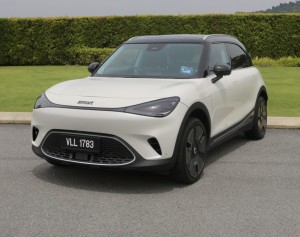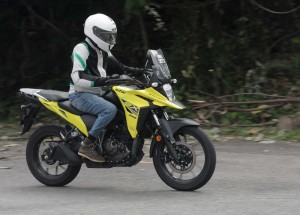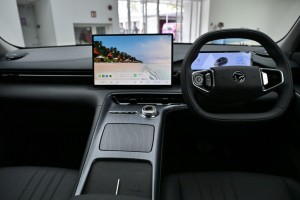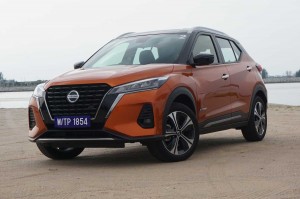Winter explains various facets of the digitalisation measures undertaken under his watch.
PETALING JAYA: Digitalisation is the mantra in a new age of making and selling cars. And that will continue to grow in importance in the coming years as car makers seek to cut costs, improve efficiencies and strive to be as competitive as they can be to carve out market share.Digitalisation is defined as enabling or improving processes by leveraging digital technologies and digitised data. It is the process of moving to a digital business.
It's a bold new world where car makers go beyond selling just a product but also digital services that support the car ownership experience as well. The pandemic has undoubtedly shaped and provided the impetus towards digitalisation.
StarCarSifu recently touched base with Volkswagen Passenger Cars Malaysia managing director Erik Winter on what the company is doing in the digitalisation space.

We launched the Volkswagen eShowroom on April 1, 2020 and the response has just grown exponentially. Malaysian customers are very receptive to the idea of buying a car online - a double-digit percentage of our total sales now comes through our eShowroom, and we believe this really is because with the eShowroom, you can book a Volkswagen any time of the day, and enjoy exclusive deals only offered online.
In terms of challenges, we would like to look at improving the eShowroom to do more. At the moment, it is a “booking” platform, and our dealers will need to process the necessary paperwork for the purchase. However, we are constantly improving the user journey on our eShowroom, and you will be seeing updates coming soon to make the online experience a more holistic one.

During the first MCO in March 2020, the team had to adapt, and it was clear that we needed to digitalise our offerings to remain top-of-mind and relevant to the changing times. On the aftersales front, we launched our #SafeHands campaign, taking customers’ and employees’ health and safety into account.
Volkswagen owners can now service their cars without having to leave the safety and comfort of their homes. The service journey starts by owners booking their appointment online via the Volkswagen Cares app or website. Once booked, owners have the option to bring in their cars or have their cars collected and returned with our free pickup and delivery service.
At the service centre, a complimentary 5 Star Service check video recording is done and sent to owners via mobile. During the service, additional parts replacements will be sent to owners for approval where they can choose to accept or decline. Once the service and repairs are completed, an e-quotation is sent, and owners can make payment online.
I am pleased to say that our digital aftersales initiative has received very positive response and is very popular. We see about 6 out of 10 owners opting for this.

Volkswagen has always been at the forefront of digitalisation here in Malaysia. The country’s digital penetration stands at more than 80%, and we recognised the need to be where our customers are, and that is in the digital sphere.
In 2017, we made our first venture into e-commerce by collaborating with Lazada to sell 12 limited edition units of the Beetle, and we sold out in under 20 minutes.
We repeated the feat the next year (again with Lazada) and sold 11 special edition Polo in under one minute. This was a first for an automotive brand in the country, and this has not been repeated since by any other automotive brands.
I believe that that there were several factors to this success. One was that we knew our customers and what they wanted. Another was because we offered a deal so exclusive online you could not get anywhere else, not even at our dealerships. This added to the “must-have” element for the cars. So, this is definitely something that we will happily repeat with the right product.
For our current model line-up, there is the Volkswagen eShowroom, parked within our website, where customers can visit to enjoy exclusive online deals. And to those looking at pre-owned Volkswagen vehicles, we also offer attractive deals on our Das WeltAuto website. Das WeltAuto is Volkswagen’s global used-car programme that offers customers certified used cars they can trust.
Each vehicle undergoes a stringent 133-point vehicle inspection check and is sold with 12-months roadside assistance and 1-year extended warranty.

With the number of social media users in the country rising every year, it goes without saying that social media plays a crucial role as avenues for our owners and followers to interact with us. Our current platforms are Facebook, Instagram and Youtube, and in the past one year we have seen a 21% growth in our number of followers.
The individual platforms are used to target different audiences, and we curate and create content with specific messages for our respective audiences. As an example, we use more video-based content on our Instagram page as users there are younger and more visual, while we use Facebook for content that is a mix of copy and visuals, with links to where our followers can find out information on various sales and aftersales topics. At the moment, Facebook is our main channel for prospecting and to collect leads.
I am also pleased to say that even on our social media channels, our strong relationship with our social media partners have provided us with the opportunity for several milestones in the industry. They include:
> The first automotive brand in the market to sell cars on Instagram
> The first automotive brand in the market to sell cars on Lazada
> The first automotive brand in Malaysia to use IG Guides
> In collaboration with multiple KOL's: We are the first automotive brand in the market to use "Live-With" for livestreams on Instagram
> The first brand to pioneer Dynamic Ads on Facebook for retargeting
We are also constantly exploring new platforms to see what works for us. So who knows – you might even see Volkswagen Malaysia on TikTok very soon!

There are currently 18 Volkswagen dealerships nationwide with both sales showrooms and authorised service centres, and with this figure, we have been able to meet the needs and demands of our owners around the country. It is about quality and not quantity, and because of this we continue to work with our dealer partners in strengthening and improving their level of sales and aftersales service for Volkswagen owners out there.
Our dealers play a key role in the overall ownership experience, and though our offerings are now digitalised, it only serves to emphasise the importance of the human element and personal touch that comes with face-to-face interaction.
The customer purchase journey is a combination of both digital and physical experiences.
Customers usually do their research online when deciding on their next car purchase. The consideration stage is where they will walk into showrooms and speak to our sales consultants, to see the cars up close as well as go on test drives. This is common especially when buying a big-ticket item such as a new car, and we feel for now here in Malaysia, no digital experience can replace this. The final stage before purchase can be done online where they can place a booking via the Volkswagen eShowroom.
To complement the above, there are pop-up showrooms. Pop-up stores are already trendy here in Malaysia, and this is something you will see from Volkswagen once the situation allows for us to.

Any digitalisation exercise is done to improve process efficiency, and it is no different for our vendors.
While our local parts supply chain vendors have yet to fully digitalise their offerings, we are already doing what we can on our end. One example is the way the Volkswagen regional parts distribution hub at Tanjung Pelepas in Johor operates. The hub provides genuine parts and is a key contributor to the supply chain for 21 markets in Asia Pacific. Through digitalisation, the parts hub allows for parts order and delivery to be processed faster, is more convenient and efficient.
Another example is with our plant in Pekan, where all our models are assembled. From a supply chain perspective, the plant uses complex systems that maps out the demand and usage of various components. This gives them control of the parts, is cost-efficient, and helps to minimise wastage.

Digitalisation has changed the automotive retail landscape, and this process was accelerated by the Covid-19 pandemic.
For Volkswagen Malaysia, digitalisation does not mean a reduction of workforce. On the contrary, everyone within the ecosystem has a role to play. It can be a matter of redirecting specific roles, learning new skillsets, and understanding what is needed in order to integrate and adapt with the times. Most importantly, support must be there to ensure success.
In the case of our dealer partners, the closure of showrooms during last year’s MCO forced them to evolve and shift their focus online. To support them, we provided training, the tools and the know-how to bring their business online, particularly through their social media channels. Our dealers are now digital-savvy and understand the importance of being present online. Livestream events on their social media channels where they conduct product walkthroughs, demonstrations and consultations on both sales and aftersales offerings are the norm now.

The VW iD.4.
For the moment, we have no concrete plans to launch the iD family in Malaysia as this will require the strengthening of the overall infrastructure. For example, a charging infrastructure and certain incentives for customers must be present. The market demand and volume also need to be taken into consideration.
We welcome the current discussions regarding the development of an e-mobility roadmap for Malaysia. Once we are ready to bring in electric vehicles, we foresee our physical dealerships and online eShowroom playing a role in how they are marketed and purchased. There will need to be a fine balance between on-ground and online marketing activations, and customers will need time to familiarise themselves with the vehicle, how it drives and its maintenance – so education is key here. Online sales through the eShowroom will still be relevant as the last step in the consumer journey before purchase.
Having said that, we believe that our customers’ expectations are growing increasingly consistent with the wider retail avenues and we plan to cater to them through all the various channels.












